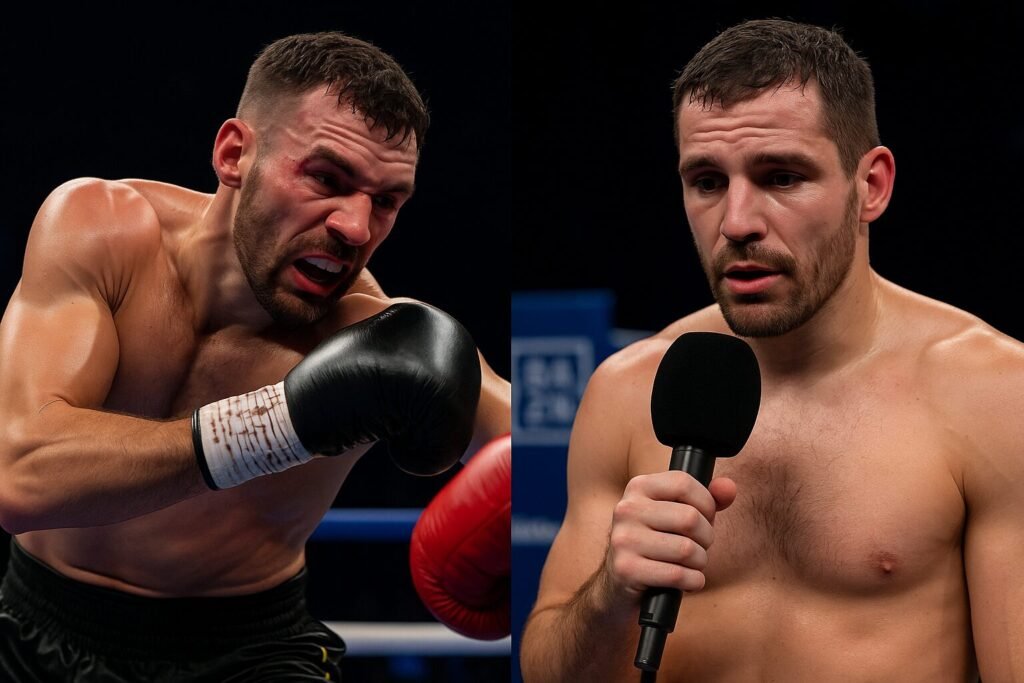When the Bell Rings and the Blame Game Begins
It’s become almost predictable — a fighter loses, and within hours or days, the talk turns to injuries. “I had a torn bicep.” “My shoulder went in camp.” “I wasn’t 100%.”
We’ve all heard it before. But as fans, it raises a fair question: are these boxing injury excuses genuine insights into what really happened, or just a way to soften the blow of defeat?
Boxing is a brutal game. Every fighter walks to the ring carrying some kind of knock, bruise or strain. That’s part of the job. But when you start hearing injury talk only after the result doesn’t go their way, it’s hard not to roll your eyes a little.
Pride, Pressure and Public Perception
For a top-level fighter, pride isn’t just emotion — it’s currency. The minute you admit you’re less than 100%, people start doubting you. Promoters hesitate, fans lose faith, and rivals see blood in the water.
So what do fighters do? They stay silent before a fight and play it tough. But when the loss comes, the instinct to explain kicks in. Nobody wants to look like they were simply beaten by the better man.
The irony is, we often have more respect for fighters who just hold their hands up and say, “I lost to the better man on the night.” It shows honesty, humility, and mental toughness — all the things that truly define a champion.
The David Haye Lesson
If there’s one fight that perfectly captures this conversation, it’s David Haye vs Wladimir Klitschko back in 2011. Haye had hyped that fight for months, promising to dethrone the heavyweight king. But when the bell rang, Klitschko dominated him from start to finish.
Then came that post-fight interview. Haye pulled off his shoe and showed the cameras a broken toe, claiming it limited his movement. Now, maybe it did — but that wasn’t really the issue. The problem was timing. He never mentioned it in the build-up, never gave fans the context beforehand.
To many, it sounded like damage control. And that’s the danger with boxing injury excuses — they can instantly change how people remember a fight. Instead of focusing on the opponent’s performance, the story becomes about what went wrong for the loser.
Personally, I’ve always had more respect for fighters who say nothing or admit they were second best. I’d rather see a boxer pull out of a fight altogether if they’re injured, take time to heal, and come back stronger — than step in half-fit and try to explain it away after the fact.
Because the truth is, it’s not weakness to withdraw. It’s smart. The sport is dangerous enough when you’re healthy.
The Thin Line Between Explanation and Excuse
That’s not to say every injury story is fake. Far from it. Training camps are brutal. Fighters push through pain that most of us couldn’t tolerate for a minute. Sometimes, an injury really does affect performance. But when it’s only mentioned after a loss, it sounds like justification rather than honesty.
The psychology behind it is simple. After a defeat, every fighter’s confidence takes a hit. By pointing to an injury, they protect their self-belief. “It wasn’t me who lost — it was my body that failed me.” It’s a coping mechanism as much as a PR move.
Still, fans have sharp ears. We can tell the difference between authenticity and excuses. And that’s why silence — or simple honesty — so often earns more respect than a post-fight explanation ever could.
The Real Fight Is With Pride
At the end of the day, this is about reputation. Fighters are sold as superhuman — unbeatable warriors who never quit. But that image comes at a price. Admitting vulnerability in public doesn’t fit the brand, even when it’s the truth.
So when injuries happen, most will hide them until they can’t any longer. But every once in a while, a fighter breaks the mould — they admit their body gave out, without spin or self-pity. And when they come back stronger, fans remember that honesty.
That’s the real test of character.
Final Bell
Maybe it’s time we stopped punishing honesty in boxing. Not every fighter who mentions an injury is making excuses — some are just telling the truth. But if you’re hurt, be upfront. If you lose, own it. That’s how respect is earned in this sport.
Because every great comeback starts with the words: “He beat me fair and square — but I’ll be back.”
If you’ve got your own take on this one, drop a comment and join the debate. And for more boxing talk, opinion and honest analysis, visit CMBoxing.co.uk — where real fans keep the conversation alive.

